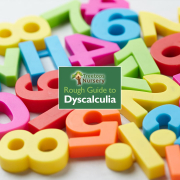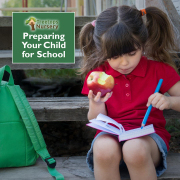Is Your Child Getting Enough Sleep?
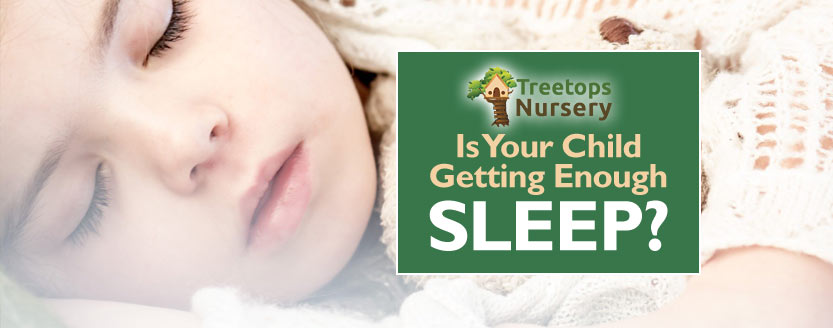
A good night’s sleep is essential for all of us. Without it, we struggle in the following days and are sure to perform less than optimally.
 The Adverse Effects of Too Little Sleep
The Adverse Effects of Too Little Sleep
The adverse effects of a poor night’s sleep are even more pronounced for under-fives and babies. As well as simply being tired, they can become emotional, grumpy, uncooperative and stressed. They might even be inclined to throw tantrums and to become a real danger to themselves. The distress they are feeling through lack of sleep is clear to see, even if they themselves don’t understand why they are feeling the way they do.
What’s also obvious is that they won’t be able to learn as effectively as they might otherwise have done. Attention spans, cognitive function, memory skills and levels of alertness are all known to suffer after a poor night’s sleep.
If poor sleep becomes a regular occurrence, there are also longer-term health risks that could become real concerns. Blood pressure, diabetes, weight, mental health and the release of natural growth and repair hormones can all suffer if children have regular sleep deficiency. So, sleep is incredibly important.
How Much Sleep do Children Need?
Babies and young children need far more sleep than adults. According to The American Academy of Sleep Medicine, they require the following:
| Child’s Age | Sleep Required (Per 24 Hours Including Naps) |
|---|---|
| 4 months to 1 year of age | 12-16 hours |
| 1 to 2 years of age | 11-14 hours |
| 3 to 5 years of age | 10-13 hours |
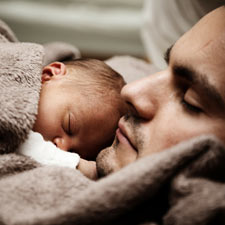 You can see that they require a little less sleep as they grow progressively older.
You can see that they require a little less sleep as they grow progressively older.
How to Help Your Child Sleep Well
There are many reasons why babies and children may have trouble sleeping, but there’s quite a bit parents or carers can do to help. Here are some ideas that may help them to fall asleep and then to stay sleeping soundly. This is part of a wider approach to what’s known as Sleep Hygiene, which is the entire approach to bedtime, including the lead up to it.
Sleep Hygiene
One of the most effective ways any parent can help a child receive the right quality and quantity of sleep is to maintain a set routine around bedtime. If set times and rules are in place and always adhered to, then going to sleep at the right time will become virtually automatic. Children will physiologically and mentally adapt and then expect it, becoming tired and ready to sleep around the ‘right’ time. They will also be less inclined to ‘fight’ the rules when they have learned that they’re not negotiable. With some children it may take a while to get to this point, of course — but the bigger ‘sleep hygiene’ approach will ultimately help.
Winding Down Before Bedtime
A winding-down regime can be very useful to get very young children in the right mindset for bedtime. A warm bath or shower can be part of this, as can dimmed lights and perhaps a short bedtime story.
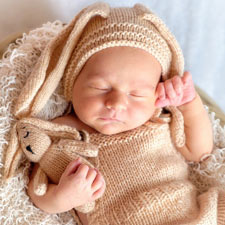 A Peaceful, Quiet, Bedroom Set-up
A Peaceful, Quiet, Bedroom Set-up
The baby or child’s bedroom also needs to have the right set-up. They need to be comfortable and located in a quiet part of the house. Having them just a touch cool will also encourage the child to nestle down in the warmth of their bed. Often a favourite cuddly toy will also give them some comfort and the feeling of security.
A low level of lighting before bedtime is also a great idea. Once it’s time to sleep, total darkness is healthy for sleep although some children may sleep better when they can see the faint glimmer of a nightlight.
Distractions like nearby toys should be avoided, otherwise there’s a risk that the infant might begin to associate bedtime with playtime.
Avoid Stimulants
 Stimulants should be avoided before bedtime. Drinks containing caffeine will keep children awake, so none should be given any time after lunch time, ideally. Caffeine can be found in some fizzy drinks and energy drinks, as well as in tea and coffee. Warm milk, in contrast, will be non-stimulating and actually quite soothing. Be careful not to give drinks too close to bedtime, though, and remember to get the child to visit the loo before going to bed, otherwise they may need to wake up in the night to pay a visit.
Stimulants should be avoided before bedtime. Drinks containing caffeine will keep children awake, so none should be given any time after lunch time, ideally. Caffeine can be found in some fizzy drinks and energy drinks, as well as in tea and coffee. Warm milk, in contrast, will be non-stimulating and actually quite soothing. Be careful not to give drinks too close to bedtime, though, and remember to get the child to visit the loo before going to bed, otherwise they may need to wake up in the night to pay a visit.
Screens also stimulate the brain. So, handheld devices like mobile phones and tablets, as well as TVs, should not be available to the child several hours before bedtime. Their blue light, in particular, will not be conducive to sleeping, due to its stimulating affect on the brain. (You can learn more about the possible health risks associated with giving children access to handheld screens in our enlightening post for our sister nursery over in Birmingham).
It’s useful to avoid vigorous exercise or play too close to bedtime. While exercise during the daytime, particularly in the fresh air, can help young children sleep later on, doing it too close to bedtime may simply awaken their brains and have the opposite effect.
Large meals close to bedtime can also have a detrimental affect on children’s sleep, so ensure that mealtimes are sufficiently early.
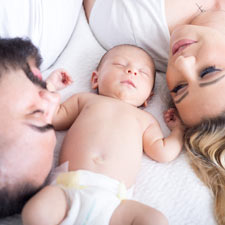 Children Visiting in the Night
Children Visiting in the Night
Many parents have experienced their child waking up in the night and coming into their bedroom for comfort. This must not be allowed to turn into a habit. Parents of children attempting to make this a regular occurrence should quietly — and without fuss — lead the child back to their bed and settle them in. Caving in to repeated attempts to end up in the parents’ bedroom (or even bed) will only lead to a bad habit forming. Such a habit would be detrimental to the sleep pattern of all concerned.
Sleeping at Treetops Nursery, Willesden
At Treetops Nursery, we’re well aware of the need for babies and children to get sufficient, high quality, sleep. For this reason, the children have a couple of sleeping sessions each day. From about 9:30am babies usually sleep for between half an hour and an hour. Then, between 12 noon and 3pm, there’s another sleeping session. The older pre-school children are given the choice whether to sleep or not during this time. Parents are encouraged to let us know if there are particular sleep patterns that they’d like us to follow for their baby or child. Every child is different, so we’re totally flexible.
A Nursery Place for Your Child in Willesden, London NW16
If you are looking for an outstanding nursery near Willesden Green, Harlesden and Kensal Green, we can help. Treetops Nursery is located in Doyle Gardens in Willesden, NW10. For further information …


